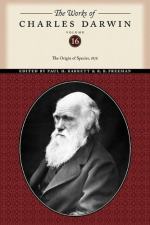We are far too ignorant, in almost every case, to be enabled to assert that any part or organ is so unimportant for the welfare of a species, that modifications in its structure could not have been slowly accumulated by means of natural selection. But we may confidently believe that many modifications, wholly due to the laws of growth, and at first in no way advantageous to a species, have been subsequently taken advantage of by the still further modified descendants of this species. We may, also, believe that a part formerly of high importance has often been retained (as the tail of an aquatic animal by its terrestrial descendants), though it has become of such small importance that it could not, in its present state, have been acquired by natural selection,—a power which acts solely by the preservation of profitable variations in the struggle for life.
Natural selection will produce nothing in one species for the exclusive good or injury of another; though it may well produce parts, organs, and excretions highly useful or even indispensable, or highly injurious to another species, but in all cases at the same time useful to the owner. Natural selection in each well-stocked country, must act chiefly through the competition of the inhabitants one with another, and consequently will produce perfection, or strength in the battle for life, only according to the standard of that country. Hence the inhabitants of one country, generally the smaller one, will often yield, as we see they do yield, to the inhabitants of another and generally larger country. For in the larger country there will have existed more individuals, and more diversified forms, and the competition will have been severer, and thus the standard of perfection will have been rendered higher. Natural selection will not necessarily produce absolute perfection; nor, as far as we can judge by our limited faculties, can absolute perfection be everywhere found.
On the theory of natural selection we can clearly understand the full meaning of that old canon in natural history, “Natura non facit saltum.” This canon, if we look only to the present inhabitants of the world, is not strictly correct, but if we include all those of past times, it must by my theory be strictly true.
It is generally acknowledged that all organic beings have been formed on two great laws—Unity of Type, and the Conditions of Existence. By unity of type is meant that fundamental agreement in structure, which we see in organic beings of the same class, and which is quite independent of their habits of life. On my theory, unity of type is explained by unity of descent. The expression of conditions of existence, so often insisted on by the illustrious Cuvier, is fully embraced by the principle of natural selection. For natural selection acts by either now adapting the varying parts of each being to its organic and inorganic conditions of life; or by having adapted them during long-past periods of time: the adaptations being aided in some cases by use and disuse, being slightly affected by the direct action of the external conditions of life, and being in all cases subjected to the several laws of growth. Hence, in fact, the law of the Conditions of Existence is the higher law; as it includes, through the inheritance of former adaptations, that of Unity of Type.




